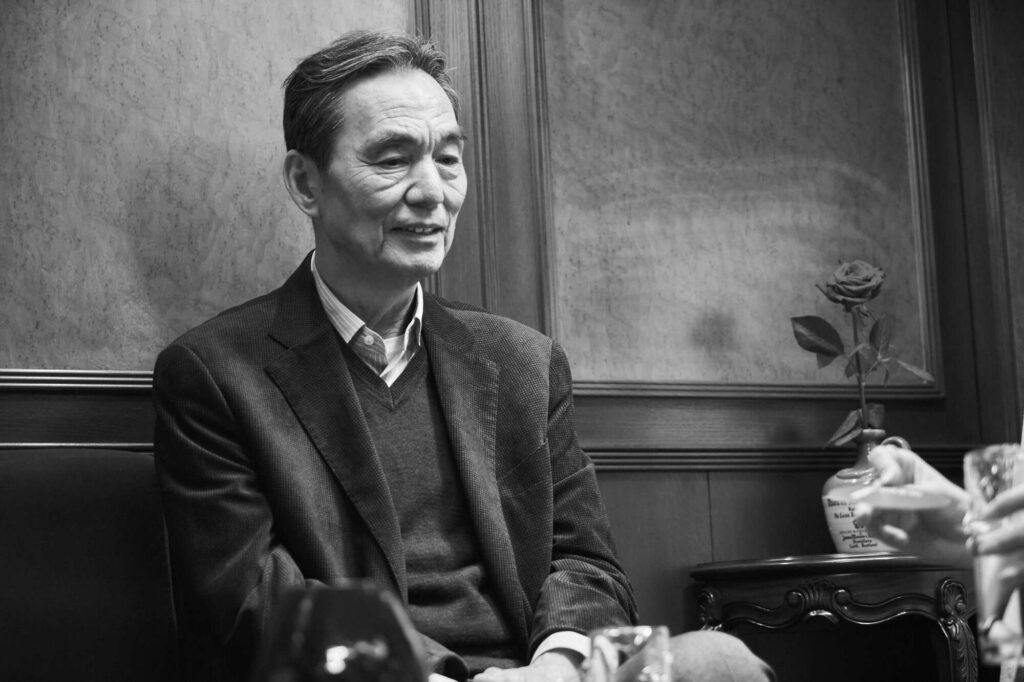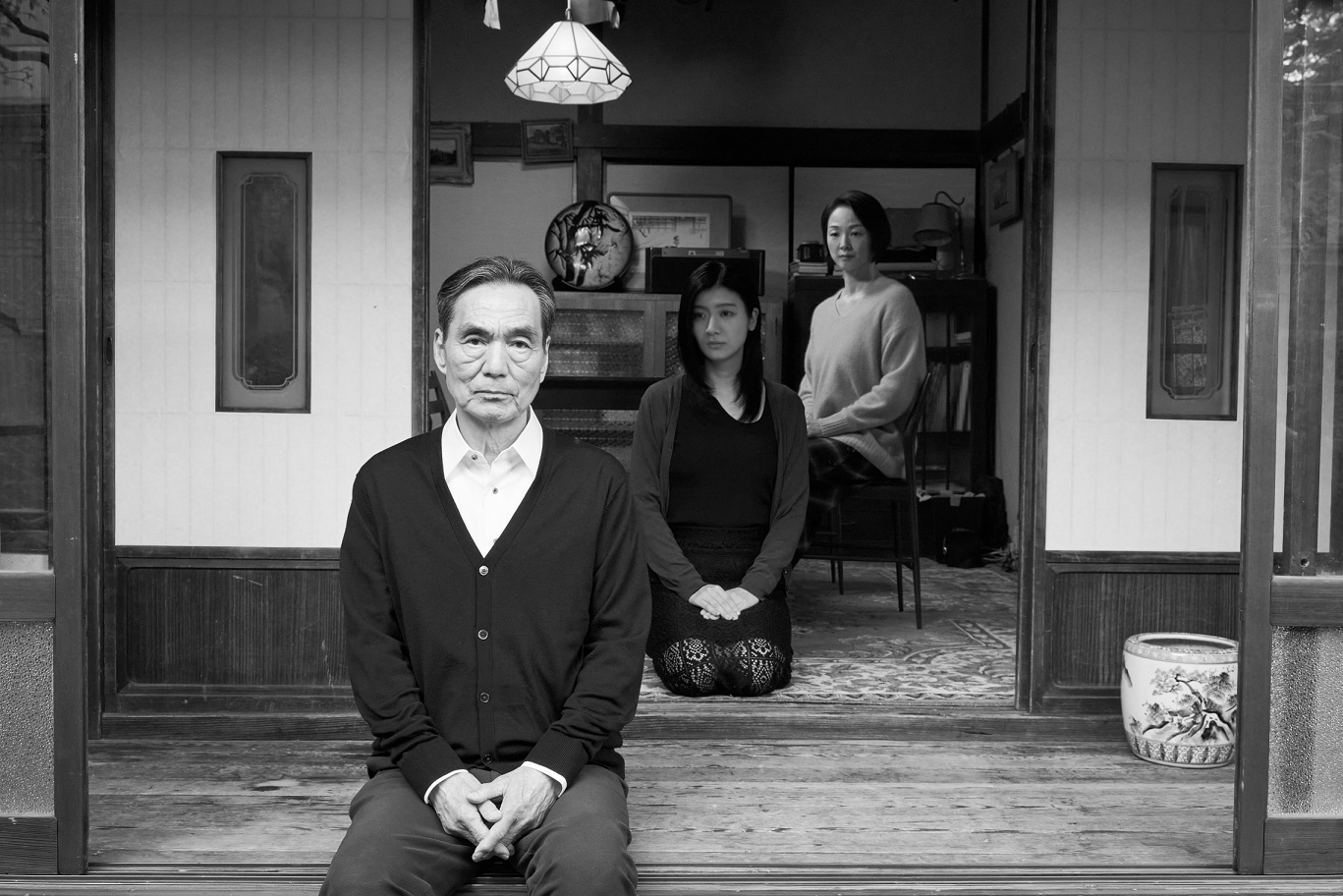‘Teki’ means enemy.
The 77-year old protagonist Gisuke Watanabe in Teki Cometh (Japanese title: Teki) can’t quite figure out the exact identity of that enemy but he’s aware it’s coming to destroy him. Will the enemy be upon him today or next week? Does he still have time to do something, anything? And then, mercifully, Gisuke dies.
That’s not a spoiler, but a crucial and inevitable event in the story of Gisuke Watanabe (played with astonishing acumen by Kyozo Nagatsuka). From the onset of Teki, Gisuke is hyper aware that death is imminent – indeed, he rarely thinks about anything else. On the surface though, Gisuke is a suave and tidy individual who is perfectly okay with dying. It’s just the ‘enemy’ that disrupts his usually serene thought processes, like a pebble in his shoe that he somehow can’t rid. He has virtually no information about this enemy other than as a mysterious link attached to a spam mail. Gisuke doesn’t dare open that link but it seems that the enemy has already infiltrated his house, poisoning the air before seeping into his dreams.
Directed and written by Japan’s veteran filmmaker Daihachi Yoshida, who’s known for being a solid artisan topped with a dash of auteur, Teki Cometh is an engrossing, even mesmerizing examination of old age in Japan’s super-aged society. That Yoshida shot Teki in black and white is an aesthetic choice both fitting and romantic. Nagatsuka turns eighty this year but aided by the artful color scheme, withstands the relentless scrutiny of the camera that’s focussed on his face and physique for almost the entire duration of the film. In other words, Gisuke is quite simply, hot.

The first half of the story concentrates on Gisuke’s orderly life. He eats, flosses his teeth, uses the bathroom, scrubs himself in the bath after sniffing his armpits. In one scene, he is lying on a doctor’s table after a bad attack of indigestion; he has eaten too much kimchi for dinner. “At your age you can’t gorge on spicy foods and expect no bad effects,” the doctor scolds him. O, the indignity.
And yet, Nagatsuka as Gisuke brings something new to the discussion of life after a certain age. He’s tall and slender, moving with a kind of grace that comes, not from hours spent at the gym but years of cultivating a particular lifestyle. Here’s a man – an elderly, Japanese man, mind you – who does all his own cooking and housework. He goes about in dress shirts and slacks during the day, then changes into pajamas and a bathrobe at night. Instead of watching TV, he reads French novels and frequents a chic bar. Restraint and self-discipline are his watchwords. At all cost, he doesn’t want to be a burden to others. Even more than that, he doesn’t want to appear ridiculous.
In 2024, the average life span for Japanese men was 81.09 years old: shorter than women by about 6 years, but longer by the same 6 years since the 1980s. This means that the average male must have a reasonably hefty amount of savings by the time he retires at age 65 to sustain the 15 or so years before he checks out of existence. Gisuke, who used to be a French literature professor, was forced to take early retirement and now he supplements his pension by writing a monthly essay in a travel magazine and giving the occasional lecture. It’s not enough, especially since the fees for a dating app totals to 120,000 yen a month.
But Gisuke takes all that in stride. Probably because of his French lit background (interestingly, Nagatsuka is a Sorbonne University graduate who studied French theater), Gisuke has a laissez-faire attitude propping up his epicurean lifestyle. He needs that lifestyle in order to be his his dandified, gentlemanly self and cocoon his fragile but sizable ego.
Everyday, Gisuke stares at the numbers in his bank account, calculating just how much longer he can last before running out of money. “I don’t want to live just for the sake of living,” he says to himself. When the cash is gone, he has a grand plan: suicide, after making arrangements for his funeral.
As for relationships, though Gisuke has been a widower for the past two decades, he’s better off than many older men, like his unappealing next door neighbor. He has kept in touch with a handful of former students, now in their late 30s to 40s, who once idolized him and are now happy to take the time to see him over coffee or drinks.
Yasuko (Kumi Takiuchi), whom he secretly lusted after when she was his student, now comes to see him at his home two or three times a year. They share a meal, open a bottle of wine and reminisce about the old days. In one scene, she falls asleep on his sofa and wakes up in time to get to the station and catch the last train. Gisuke can’t bring himself to ask whether she wants to stay the night. If she had said yes (as he fantasizes later), he would have melted with happiness.
Teki is based on the 1998 novel of the same title by Yasutaka Tsutsui. Tsutsui is one of Japan’s most influential novelists of the late 20th century, a pop culture giant with a penchant for the sublime and academic. At 90 years old, he’s still writing while residing in a care facility. These days he limits himself to essays and memoirs. Earlier this year, Tsutsui was interviewed by Yomiuri Shimbun and was full of praise about the adaptation, adding that he advised Yoshida to portray Gisuke as an older man prone to “dreams and hallucinations” instead of a geriatric with dementia.
Accordingly, dreams and hallucinations are what come to define both Gisuke and the film. In the beginning, Gisuke seems to be in total control of his existence and then gradually, almost imperceptibly, we witness his mind fraying at the edges. In his nighttime dreams, his dead wife Nobuko (Asuka Kurosawa) rebukes him about the fact that he had never taken her to Paris. Before long, she appears in the house in the daytime, telling him that he must never remarry and that she knows of his lust for Yasuko. In the next scene, Yasuko is with him in the house., and they have a meal of lamb with bearnaise sauce, which is a dish from Marcel Proust’s In Search of Lost Time. Gisuke made this from a recipe he found on the Internet, because a young hostess at the bar he goes to, told him she liked Proust.
Did Yasuko really come to the house, or was that a fantasy playing out in his head? Did he ever have that conversation with the hostess? He must have, because he offers to pay for her college tuition and after that, his bank statement shows he has just 6,505 yen left in his account.
But as Gisuke says in one of his dreams, “This is all a fantasy, and it’s okay because I’m not being a burden to anyone in the real world.” It’s a touching sentiment and aptly, the story is ultimately kind to Gisuke, shielding him from the usual, humiliating incidents of old age. Gisuke exits the world with dignity and full of kind thoughts for others, which is probably the best end any of us could hope for.

Teki Cometh artfully shifts from a serene character study to a chilling exploration of a deteriorating mind. With Nagatsuka Kyozo’s compelling performance and Yoshida Daihachi’s deft direction, the film navigates the unsettling borders between reality and illusion, evoking a profound sense of existential dread. It’s a unique and thought-provoking film that really sticks with you.